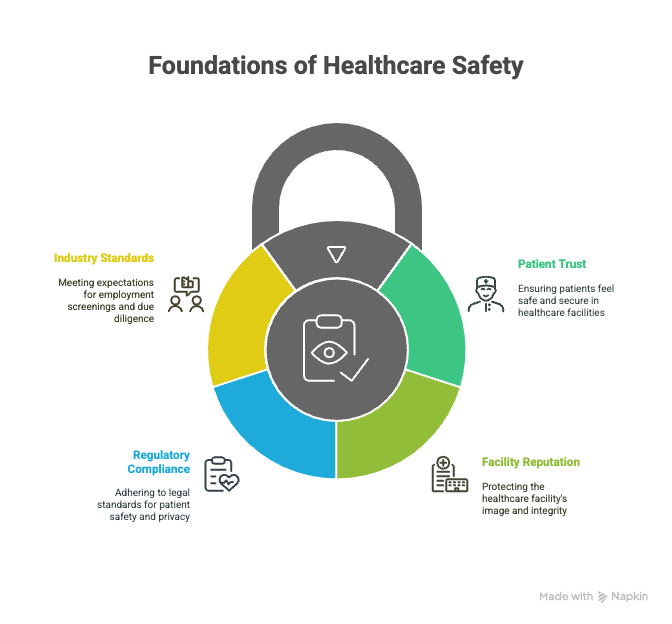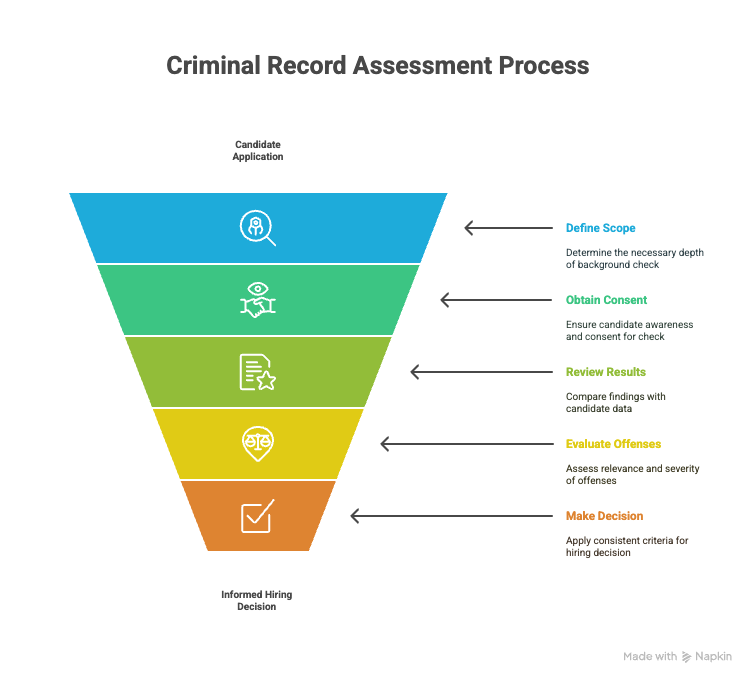In the healthcare industry, ensuring the safety and trust of patients is paramount. As part of this responsibility, employers must carefully evaluate the criminal records of potential hires. This comprehensive guide will explore how to effectively conduct criminal record assessments for healthcare roles while balancing legal compliance and ethical considerations. We will delve into the nuances of evaluating criminal histories, identifying disqualifying offenses, and aligning assessments with healthcare HR compliance standards.
Key Takeaways
- Criminal record assessments are vital for maintaining trust and safety in healthcare environments.
- These assessments go beyond just checking boxes, helping ensure that only qualified and trustworthy professionals are hired.
- Understanding both legal requirements and ethical considerations is crucial for fair and compliant hiring practices.
- Offenses like abuse, theft, and drug-related crimes are common disqualifiers, but every case should be assessed individually.
- Embracing technology and maintaining thorough documentation can enhance the efficiency and accuracy of background checks.
Introduction
Trust and safety sit at the heart of healthcare. When patients enter a hospital or clinic, they need assurance that those in charge of their care are trustworthy. Criminal record assessments are a critical tool in building and maintaining this trust. By thoroughly checking the background of potential hires, healthcare providers can uphold a safe environment for both patients and staff.
Criminal record assessment, in healthcare, means looking into the past offenses of a candidate before they get hired. This isn't just about ticking boxes; it plays a significant role in safeguarding the integrity of healthcare facilities. These assessments reach beyond simple legal complianceâthey are about making informed hiring decisions that create a foundation of trust.
This article presents a detailed guide on evaluating criminal records within healthcare. We'll explore legal obligations, ethical considerations, and effective practices. Whether you're a hiring manager or an HR professional, understanding these assessments will help you maintain a safe and reliable healthcare environment.
Importance of Criminal Record Assessments in Healthcare
Trust and safety are not just priorities; they are imperatives in healthcare. When patients walk into a facility, they must feel secure, knowing the staff is vetted and trustworthy. Criminal record assessments help in assuring this environment.

You have a duty to your patients and your team to screen potential hires thoroughly. This doesn't just protect patients; it protects your facility's reputation and staff. By assessing criminal records, you minimize the chances of misconduct and breaches, creating a safer space for everyone involved.
Regulatory compliance isn't optionalâit's mandatory. The Department of Labor and other entities set clear guidelines for background checks to protect patient safety and privacy. Regulations vary by state, but the core idea remains the same: healthcare workers should display integrity and reliability. Understanding these legal frameworks is crucial to maintaining compliance.
Industry standards and governing bodies set expectations for employment screenings. These standards ensure that you perform due diligence without compromising fairness. Consistency in applying these checks fosters trust within your organization and with patients.
Criminal record assessments are a vital step, more than just ticking a box. They're an investment in your healthcare organizationâs future, ensuring you build a strong, safe, and reputable team.
Understanding Healthcare Background Checks
Healthcare background checks go beyond a criminal record. They form a comprehensive filter designed to ensure that only qualified, trustworthy professionals care for patients. Let's break it down.
Components of a Background Check
A standard healthcare background check includes several elements. You start with identity verification to confirm the person is who they claim to be. Next, you look at employment history to ensure the candidate has the experience they say they do. Education verification follows, confirming any degrees or certifications. Finally, you conduct a criminal record check, a vital step in maintaining a safe environment.
Types of Criminal Records Checked
Criminal records fall into categories. Felonies, the most serious offenses, could disqualify a candidate depending on their nature. Misdemeanors are less severe but still matter, especially if patterns of behavior are evident. Infractions are minor but can still appear. Knowing which to focus on is essential for making informed decisions.
Role of Criminal Background Screening in Healthcare
In healthcare, a criminal background screening is more than a formality. It safeguards patients and upholds trust in medical institutions. Hiring someone with a suitable past ensures that vulnerable individuals are protected from potential harm. Your role as an employer is to balance fairness with the imperative of safety.
When you evaluate healthcare candidates, ask yourself: does this individual's history align with the responsibilities they will hold? Are you confident in their ability to provide safe, ethical care? With a well-rounded background check, you can answer these questions confidently.
Identifying Disqualifying Offenses in Healthcare
Certain offenses can pose significant risks when it comes to healthcare roles. Criminal acts like abuse, theft, and drug-related crimes often stand at the forefront as disqualifiers. These offenses directly impact patient safety and trust, making them critical in assessing suitability for a healthcare position.
Legislation plays a major role in determining which offenses are disqualifying. The Fair Credit Reporting Act (FCRA) establishes guidelines for employer background checks, including criminal records. State laws can vary, sometimes imposing stricter regulations or defining additional disqualifying offenses. These laws ensure that the screening process respects the rights of candidates while maintaining public safety.
Deciding whether an offense is relevant involves more than checking boxes. Consider the nature of the crime and its connection to the job. For instance, a theft conviction may be more concerning for roles involving access to patient property. Recency also mattersâa crime committed years ago may hold less weight if the candidate has demonstrated rehabilitation and a commitment to maintaining lawful conduct.
You need a balanced approach. Assess each candidate on a case-by-case basis to ensure fair treatment while safeguarding patients and the organization. What criteria do you consider when determining if an offense is disqualifying in your healthcare hiring?
The Process of Criminal Record Assessment in Healthcare
Initiating a criminal background check begins with clarity about your goals. First, identify the scope of the check necessary for the position. For example, roles requiring patient interaction might need deeper scrutiny. Ensure candidates are aware of the check and have provided consent, a non-negotiable step.
Once initiated, results need attention to detail. Start by comparing the findings with data provided by the candidate. Discrepancies require further investigation. Be mindful of the types of offenses. A theft conviction might be relevant for a role involving access to patient belongings, while a decade-old minor offense might warrant less concern.
Making informed decisions means applying consistent criteria. Implement decision matrices or scoring systems to aid fairness. Consider the nature of the crime, its relevance to the job, and any evidence of rehabilitation. Document every step. This not only supports fair decisions but also ensures compliance with legal standards.

Throughout, uphold transparency with candidates. If a decision is negative, offer to explain why and provide an avenue for candidates to contest inaccuracies. Engaging with this process thoughtfully safeguards patient trust and strengthens your organization's hiring integrity.
Legal and Ethical Considerations
Healthcare HR departments must comply with a range of legal requirements when conducting background checks. The Fair Credit Reporting Act (FCRA) sets the foundation, ensuring that checks are performed fairly and with proper consent. Familiarity with both federal and state laws is essential, as regulations may vary. For instance, some states limit the look-back period for certain offenses. It's crucial to keep updated with these laws to avoid legal pitfalls.
Individualized assessments play a critical role. Not every offense holds the same weight in every context. Consider factors like the nature of the crime, its relevance to the job, and the time elapsed since the offense. For example, a theft conviction might be more concerning for a position with access to patient property, whereas it might hold less relevance for a role with no such access. This nuanced approach not only supports fair hiring but also helps in maintaining a diverse workforce.
Balancing fairness and safety is a fine line. The aim is to protect patients without unfairly penalizing candidates for past mistakes. Transparency with candidates regarding what will be checked and how the information will be used is beneficial. It fosters trust and allows candidates to provide context for any findings.
These considerations highlight the complex intersection of legal mandates and ethical responsibilities in healthcare hiring. By conducting thorough and fair assessments, you contribute to a safe and trustworthy care environment. Are you confident that your hiring practices meet these standards?
Enhancing Your Healthcare Hiring Process
Streamlining your criminal record assessments can significantly improve hiring in healthcare. Start with thorough documentation. Keep detailed records of every check you conduct. This includes dates, results, and follow-up actions. Not only does this ensure compliance, but it also maintains accuracy over time.
Training is essential. Regularly update your HR team on the latest laws and best practices. For instance, awareness of updates to the Fair Credit Reporting Act can keep your team ahead. This minimizes legal risks and boosts the competence of your hiring process.
Embrace technology to enhance efficiency. Automated background check systems can reduce the time and error associated with manual checks. Systems with real-time updates and integrated compliance checks can save your team hours of work.
Don't let your process stagnate. Regularly revisiting and refining your policies to match changing laws and societal norms is key. Consider feedback from your teamâwhat challenges do they face in daily operations? Analyze where improvements can be made and adapt accordingly.
How can you keep improving? Encourage a culture of continuous feedback and learning. By involving your team in the ongoing evolution of your process, you ensure better alignment with both legal standards and organizational goals.
Conclusion
Conducting thorough criminal record assessments in healthcare is crucial for maintaining trust and safety. Healthcare employers have a responsibility to ensure that their hiring practices reflect a balance between compliance with legal standards and ethical considerations. As state and federal regulations evolve, employers must stay informed and adapt their processes to align with these changes.
Looking ahead, the landscape of criminal record assessments will likely see further integration of technology. This can streamline the process, making it more efficient while still prioritizing accuracy and fairness. However, the human element should not be overshadowed by automation. Employers should continue to conduct individualized assessments and weigh mitigating factors to ensure that decisions are both fair and in the best interest of patient safety.
Continued vigilance in criminal record assessments is essential. By prioritizing thorough and objective evaluations, healthcare employers contribute to a trusted and secure environment, ultimately benefiting both patients and staff.
Frequently Asked Questions (FAQs)
What criminal offenses disqualify someone from working in healthcare?
Violent crimes, sexual offenses, and major drug offenses often disqualify individuals from healthcare roles. Crimes involving abuse, neglect, or exploitation of vulnerable individuals may also lead to disqualification.
Can someone with a felony work in a hospital?
It depends on the felony and the hospital's policy. Some hospitals may consider candidates with certain non-violent felonies, while others adhere to stricter guidelines. Checking the specific hospital's regulations is essential.
How should HR assess a criminal background in healthcare hiring?
HR should evaluate the relevance of the offense to the job role, the time that has passed since the offense, and evidence of rehabilitation. Consistency with legal standards and company policies is critical.
What is an individualized assessment in a background check?
This assessment involves reviewing a candidate's criminal record on a case-by-case basis. HR will consider the nature and gravity of the offense, the time elapsed, and its relevance to the position.
Are background checks for nurses different than for other roles?
Yes, nurses often face more stringent background checks due to their direct patient care responsibilities. These checks typically include verification of licenses and a review of any disciplinary actions.
What should you do if you have a criminal record and want to work in healthcare?
Research the specific requirements of healthcare employers and consider roles that may be available to you. Be prepared to discuss your record honestly and highlight any steps toward rehabilitation.
How long does a criminal conviction affect your ability to work in healthcare?
The impact can vary based on the nature of the conviction and the employer's policies. Some employers may look at offenses from any time, while others may only consider more recent convictions.
Are there any resources available for people with criminal records seeking healthcare jobs?
Yes, organizations and programs assist individuals with criminal records in finding employment, including in healthcare. Look into local workforce development agencies or nonprofits focused on reentry support.
How can you explain a criminal record during a healthcare job interview?
Approach this topic with honesty. Briefly explain the circumstances, emphasize personal growth, and provide examples of rehabilitation or positive changes since the conviction.
Do expunged records show up on healthcare background checks?
Generally, expunged records should not appear on background checks. However, it depends on state laws and the thoroughness of the background check process used by the employer.

GCheck Editorial Team
Meet the GCheck Editorial Team, your trusted source for insightful and up-to-date information in the world of employment background checks. Committed to delivering the latest trends, best practices, and industry insights, our team is dedicated to keeping you informed.
With a passion for ensuring accuracy, compliance, and efficiency in background screening, we are your go-to experts in the field. Stay tuned for our comprehensive articles, guides, and analysis, designed to empower businesses and individuals with the knowledge they need to make informed decisions.
At GCheck, we're here to guide you through the complexities of background checks, every step of the way.





